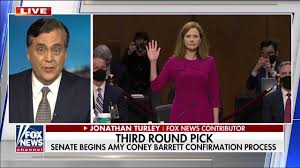Intellectual license

One of the characteristic features of the age of Trump is a complete disregard for even the most minimal standards of intellectual honesty.
Here’s Steve Vladeck catching out the shameless Jonathan Turley for pretending that he didn’t write a law review article that directly contradicted the view he’s taking today on trying an impeached official who is no longer in office:
Minimal honesty would require Turley to acknowledge that he once took exactly the opposite view of the question that’s he’s taking now, and perhaps even try to explain why he’s changed his mind, but minimal honesty would interfere with getting TV bookings, so that’s one luxury Turley can’t afford.
Every time Turley appears on TV somebody should repost this, from the October 5, 1998 Washington Post:
Mark Glaze, a third-year law student at George Washington University, turned on the television three weeks ago and started seething. There, on his screen for the umpteenth time, was Jonathan Turley, a GWU law professor who has been a ubiquitous talking head during the Monica Lewinsky scandal. “Turley was saying that Clinton should be impeached for conduct incompatible with his job — like lying to staffers — even if the president didn’t violate any laws,” Glaze recalls. That struck Glaze, a Clinton supporter, as profoundly galling. After all, Turley’s job is teaching law, not opining on television, and several of Glaze’s fellow students had been grousing to him that Turley was too busy nurturing his pundit career to focus on them. Glaze’s question: If Turley thinks that neglecting professional duties is grounds for dismissal, shouldn’t he, too, be fired? Glaze decided to put that directly to Turley — and conduct a devious little experiment at the same time. On Sept. 11, he left the professor a phone message identifying himself as a GWU student and asking for an appointment. Thirteen minutes later, his roommate dialed the same number and identified herself as a producer at “ABC World News Tonight,” which she is not. Glaze’s call was not returned, he said. But the message from the “producer” was returned 32 minutes after it was left, his roommate said. Two hours later, Turley called again. “… It’s Jonathan Turley,” he said on the message tape, according to a transcript provided by Glaze. “I just got back to my office. I don’t know if you’ve been trying to reach me. If so, we should talk.” Turley would not comment about Glaze’s mini-hoax. Instead, he referred a reporter to a pair of memos he sent Glaze in which Turley stated he had no record of Glaze’s call. He also wrote that even though the week in question was particularly hectic — his wife gave birth to a son and there were numerous court filings in a Monica Lewinsky-related legal case — he was still able to meet with students. And since Glaze has never been a student of Turley’s, he’s hardly obliged to make time for him. At minimum, however, Glaze can prove that he called Turley. Phone records from his day job at a local law firm show that on Sept. 11 he placed a call lasting 25 seconds to Turley’s secretary’s line, to which Turley’s voice mail refers callers seeking an appointment. But the highlight of Turley’s memos comes when he implies Glaze is just angling to get his name in the newspaper, an allegation that raises a nearly comic pot-and-kettle problem. Turley has been quote-mongering throughout the Lewinsky matter, primarily to offer soothing justifications of Kenneth Starr’s latest stratagems. Turley showed up on television 39 times between January- and mid-August, according to a Time magazine compendium of most active Lewinsky kibitzers. He placed seventh, thanks in large part to 10 consecutive Sunday talk show appearances. Turley’s nonstop exposure has also irked other GWU professors, who are privately grumbling that his punditry on the scandal is woefully shabby and a bit of an embarrassment to the school. As others have pointed out, Turley isn’t exactly an expert on constitutional matters; he has spent the bulk of his career focusing on environmental law and torts.
There’s a much larger problem here, which is that compulsive intellectual dishonesty is a habit that’s as hard to break as any other, and after marinating in it for decades now, the American right wing and its various faux-centrist, faux-liberal, and faux-leftist fellow travelers is now made up of people who couldn’t make an honest argument if they wanted to, which of course they don’t.


